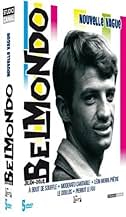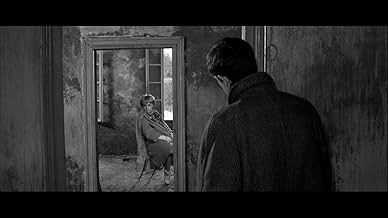Moderato cantabile
- 1960
- 1h 35min
NOTE IMDb
6,9/10
1,4 k
MA NOTE
Une femme riche et oisive est témoin d'un meurtre passionnel et rencontre un autre témoin. Elle l'interroge sur l'histoire de la victime et s'éprend de lui.Une femme riche et oisive est témoin d'un meurtre passionnel et rencontre un autre témoin. Elle l'interroge sur l'histoire de la victime et s'éprend de lui.Une femme riche et oisive est témoin d'un meurtre passionnel et rencontre un autre témoin. Elle l'interroge sur l'histoire de la victime et s'éprend de lui.
- Réalisation
- Scénario
- Casting principal
- Récompenses
- 1 victoire et 1 nomination au total
Avis à la une
Two beautiful ugly ones, or two ugly beautiful ones, a perfect couple on the screen. Neither Belmondo nor Jeanne Moreau were beauties, they had an immense personal charm that made them likeable. Plus a great talent in expressing with terrible ease what thousands of other actors struggle in vain to express. Both, Moreau and Belmondo, did not even need words, they could convey enormously just by their presence, just by a look. Two geniuses of cinematography who delighted my childhood in particular and my adult life, I saw almost all their films, only this "Moderato Cantabile" was missing because, made in 1960, I was too young, I was less than 2 years old at the time and I don't even know if it was in the cinemas in Bucharest. I found it on YouTube now in March 2025 and watched it with great interest, although I was very tired, with many hours of sleep minus. A very delicate film that is worth seeing. However, knowing the extremely low intellectual level of today, it will only be of interest to those who know who Moreau and Belmondo were.
This has to be one of the dullest films of the early Sixties. Remember that Godard, Malle, Truffaut and company had been challenging the traditions of story telling; the world seemed young again, and full of possibilities. Moderato cantabile has nothing of this spirit. It might have been made by an old-guard director like Clément or Delannoy (if they had decided to take a chance on a Duras script).
There isn't much energy or interest in this story: what happens in the first ten minutes is endlessly rehashed throughout the remainder. Belmondo is ill at ease here, or at least seems that way to me--there is no chance for any extroversion, exuberance or even anger from the character. Jeanne Moreau is used decoratively (Brook must have seen what Resnais was able to do with Delphine Seyrig in Last Year In Marienbad) and always looks elegant, if never really desperate or anguished. You know something's wrong when the piano teacher provides much of the dramatic interest: she's bullying the child into giving her a Diabelli sonata "moderately, with a singing feeling".
Note: I have just remembered that Clément did do a Duras script (Barrage contre le Pacifique) in 1958.
There isn't much energy or interest in this story: what happens in the first ten minutes is endlessly rehashed throughout the remainder. Belmondo is ill at ease here, or at least seems that way to me--there is no chance for any extroversion, exuberance or even anger from the character. Jeanne Moreau is used decoratively (Brook must have seen what Resnais was able to do with Delphine Seyrig in Last Year In Marienbad) and always looks elegant, if never really desperate or anguished. You know something's wrong when the piano teacher provides much of the dramatic interest: she's bullying the child into giving her a Diabelli sonata "moderately, with a singing feeling".
Note: I have just remembered that Clément did do a Duras script (Barrage contre le Pacifique) in 1958.
In a small provincial town that time neglects, two lost souls meander round quite circumspect, an imperceptible entwine, fading in and out of time, both longing for a moment to connect. One is captured in a marriage like a fly, cocooned inside a coffin left to die, the other, isolated, all his options firmly gated, unable to remove the bonds that tie.
Once again, Jeanne Moreau delivers a performance few other actors could have managed, both then and now, more than ably supported by a sullen Jean-Paul Belmondo, they both leave you wishing they were alive in a more modern world, where tradition and fear of the institutions that bind them have all but vanished, and they can be who they want to be. Although without those shackles the connections may well have been quite different.
Once again, Jeanne Moreau delivers a performance few other actors could have managed, both then and now, more than ably supported by a sullen Jean-Paul Belmondo, they both leave you wishing they were alive in a more modern world, where tradition and fear of the institutions that bind them have all but vanished, and they can be who they want to be. Although without those shackles the connections may well have been quite different.
for the Duras's atmosphere. for the lead actors. for the story, landscapes, dialogs, the piano lesson or for its end. for the illustration of a state of soul as result of a mixture of sin, fear, high expectations and fall. a film about a woman and a man. all in simple manner presented. a town. and few meetings. and level of dark revelation. a film of silhouettes and silence. and it is enough for discover an universe who could be part from yourself. a film about choices. and about a strange form of music. Jeanne Moreau is not a surprise. Belmondo is the perfect choice despite the expectations about other actor if you read the novel. the result - not comfortable but good occasion for reflection. about love. and about versions of Madame Bovary.
Jeanne Moreau is with her son at a piano lesson. A fuss in the street alerts her that something is going on in the street. A woman has been killed in a nearby bar. She goes there and meets Jean-Paul Belmondo, who witnessed the event. They begin a brief affair.
Under the direction of Peter Brook we get one of Mlle Moreau's typically fine performances. The story, however, is very slight. We are to see the emptiness of her life, her indifferent husband, and his dull business associates at their haute-cuisine dinners, her lack of connection to anyone save her child. Her concern with the murder is an obvious issue, with its concerns about the evanescence of life. Yet that soon evaporates. Her inability to connect to another adult save through sex renders her as shallow as the dinner guests. The audience is held in suspense, hoping she will achieve something deeper.
Under the direction of Peter Brook we get one of Mlle Moreau's typically fine performances. The story, however, is very slight. We are to see the emptiness of her life, her indifferent husband, and his dull business associates at their haute-cuisine dinners, her lack of connection to anyone save her child. Her concern with the murder is an obvious issue, with its concerns about the evanescence of life. Yet that soon evaporates. Her inability to connect to another adult save through sex renders her as shallow as the dinner guests. The audience is held in suspense, hoping she will achieve something deeper.
Le saviez-vous
- AnecdotesAccording to biographer Olivier Todd, Peter Brook offered writer Albert Camus an acting job in Moderato cantabile. Camus died in a car accident before he could take it.
- GaffesIn original release copies the title card read "Moderato contabile", but they were not retired from circulation.
- Citations
Anne Desbarèdes: Try to remember: Moderato means gently - it's nearly the same - and Cantabile means melodiously. It's easy.
- ConnexionsFeatured in Jeanne M. - Côté cour, côté coeur (2008)
Meilleurs choix
Connectez-vous pour évaluer et suivre la liste de favoris afin de recevoir des recommandations personnalisées
- How long is Seven Days... Seven Nights?Alimenté par Alexa
Détails
- Durée
- 1h 35min(95 min)
- Couleur
- Rapport de forme
- 2.35 : 1
Contribuer à cette page
Suggérer une modification ou ajouter du contenu manquant
























